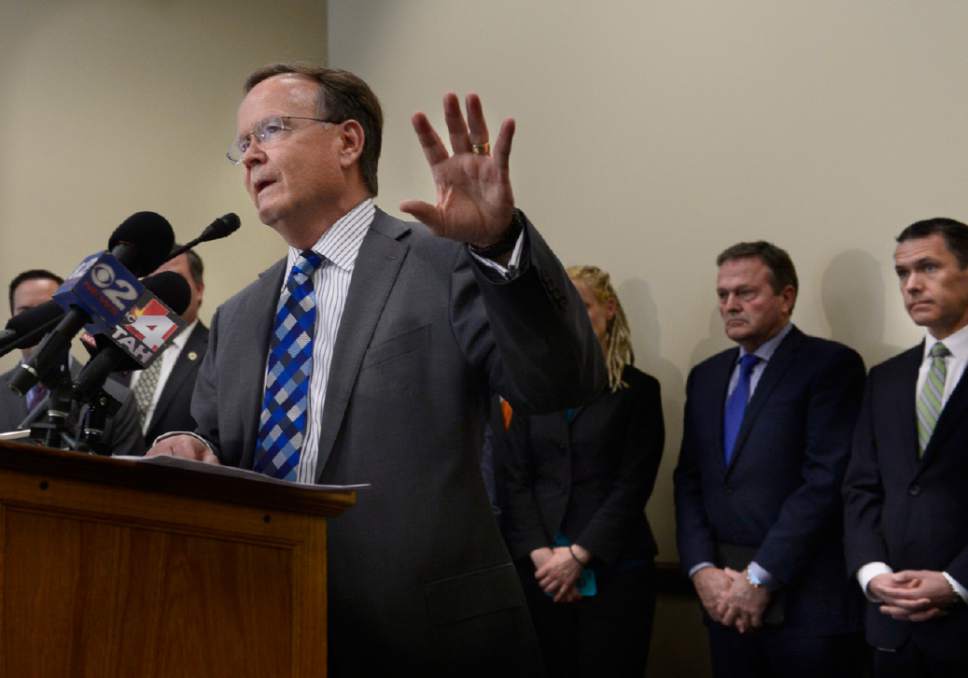This is an archived article that was published on sltrib.com in 2017, and information in the article may be outdated. It is provided only for personal research purposes and may not be reprinted.
A prohibition against the advocacy of homosexuality in Utah's sex-education classes may be on the way out after a Senate panel voted unanimously Tuesday to strike the language from state code.
The so-called "no promo homo" law is being targeted in court by Equality Utah, which filed a lawsuit in October accusing the state of promoting an anti-gay curriculum in public schools.
Clifford Rosky, a University of Utah professor and Equality Utah board member, said the legal ambiguity of what "advocacy" means has created instances in which educators are unwilling to intervene when lesbian, gay, bisexual and transgender students are bullied for fear of violating state law.
"The critical point here is that the bill is fairness for all," Rosky said of SB196. "It treats all students alike."
Debra Coe, a member of the Utah Commission on LGBT Suicide Awareness and Prevention, said the state's youth suicide rate has swelled during the past two decades, with anecdotal evidence suggesting LGBT youths are contributing to, if not driving, that trend.
She said schools are often unable to help those students, giving an example of a high school where teachers were asked to remove "safe space" posters from their classrooms to comply with the state's ban on "advocacy."
"They feel like nobody can say anything positive," Coe said. "It's OK to say negative things, but nothing positive."
Sex-education policy and LGBT issues are typically lightning rods for controversy at Utah's Capitol, but the hearing on SB196 by the Senate Education Committee was marked by a relatively brief and unanimously supportive discussion by lawmakers and members of the public.
Sen. Howard Stephenson, R-Draper, described the bill's sponsor, Sen. Stuart Adams, R-Layton, as "genius" for his preparation of the measure, which removes the "advocacy of homosexuality" restriction while adding a new restriction on the "advocacy of premarital or extramarital sexual activity."
"This could have been a very divisive bill with hours and hours of debate," Stephenson said. "What you've done here is create a win-win."
One committee member questioned whether the premarital and extramarital language was necessary, as Utah's sex-education law is already abstinence-based. But Adams replied that the bill would clarify that marriages, be they opposite- or same-gender unions, are the ideal setting for sexual activity.
"What we're trying to do is put belts and suspenders on our sex-ed statute," Adams said.
Representatives from the Utah Board of Education, Utah Eagle Forum, Family Policy Resource and Sutherland Institute spoke in favor of the bill.
Sutherland's Bill Duncan noted that in addition to equal treatment for students, the bill has an additional benefit of limiting the state's legal liability, which could allow the courts to step in and "micromanage" Utah's sex-education curriculum.
"The only change is that we're not, in our law, singling out a single identifiable group," he said.
With the committee's approval, the bill will now be transferred to the full Senate for consideration.
But Rosky said that if the bill is ultimately approved by lawmakers, it would not necessarily end Equality Utah's lawsuit. The ban on "advocacy of homosexuality," he said, is one of several areas of state law that discriminate against same-sex relationships.
While court rulings have overturned Utah's anti-sodomy laws and Amendment 3, which defines marriage as exclusively between a man and woman, those elements continue to exist in state code and in the Utah Constitution, and Rosky said that could potentially influence the actions of individual schools and educators.
"They've been passing sex-ed laws here to discriminate against gay people for a very long time," Rosky said. "We do need clarification that Utah's unconstitutional laws cannot be enforced in schools."
Twitter: @bjaminwood



